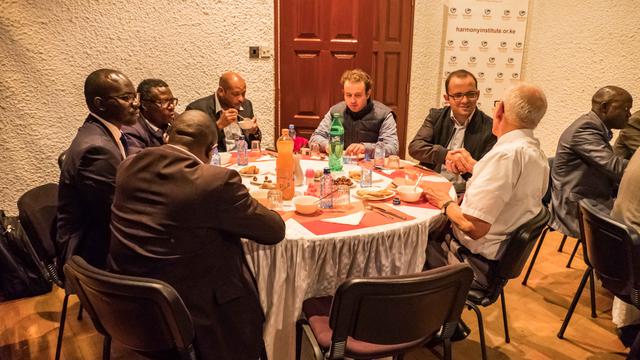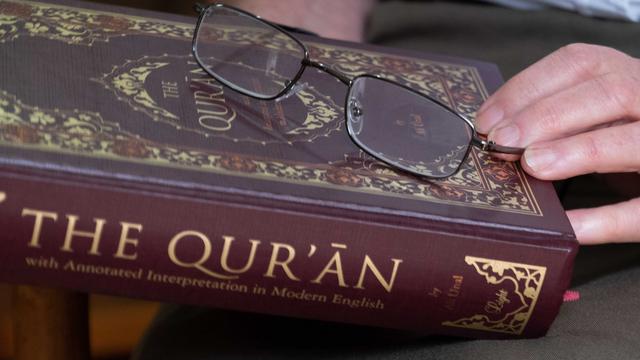Because it is significant for Public Affairs people of The Church of Jesus Christ of Latter-day Saints to understand those of other faiths, it was important to accept an invitation to attend Eid—the meal that ends the daily fast for Muslims. The venue, in the posh neighborhood of Lavington, was the house of Harmony Institute’s offices, and director Mustafa Genc was hosting.
The evening was June 12, 2018, the 27th day of Ramadan in Kenya. The belief is that during this month of Ramadan, God revealed to Mohammed the first verses of the Qur’an, Islam’s sacred text. This gathering of Ramadan consisted of friends of other faiths.

Benson Arudo, public affairs media person was invited by his university IT teacher and Muslim friend. and Benson brought along his public affairs friends, Elder and Sister Lillywhite, missionaries of the Church, who like the others eagerly partook of Eid. Some had not taken nourishment from dawn to sunset—others were Christian.
Munira Mohamed, Chairlady for Lotus, a woman’s welfare organization, greeted the guests arriving in the courtyard, sending the men in one direction and the women in another. Sister Lillywhite was seated with three other women and a few children eating at the far end of the table.
Elder Lillywhite and Benson were directed to the men’s dining area. The room was filled with chattering friends and plates of beautiful food set before them. It’s a powerful thought to think that around the world tens of millions of Muslims are fasting together at the same time.
Munira immediately asked Sister Lillywhite if she ever fasted? She responded and explained the monthly fast that her Church observes. She then passed Articles of Faith cards to each woman and asked Tuba to read number 11. Tuba exclaimed, “That’s perfectly what we believe!”

Fresh fruit was plated and spread down the middle of the table—Munira clarified the meaning of the little plate of dates. “You eat them in odd numbers,” she explained. Dates are a symbol of abundance and a Ramadan staple. Mohamad loved odd numbers and he would eat dates in odd numbers. When we follow what the prophet did, we call it sunnah, meaning tradition.
Munira told the following story—Dates are mentioned in the Qur’an with the advent of Mary in the throes of childbirth. As she was alone, a voice came to her saying ‘shake the trunk of the date palm and it will drop fresh, ripe dates upon you.’ And she came to her people carrying the newborn, telling them she couldn’t speak but ask the new baby and in their astonishment, he said, ‘I am a servant of God, make me a Prophet.’
The conversation about the most sacred month of the year turned to similarities of Christian Christmas and Muslim Ramadan. The Eid al-Fitr—the festival of the breaking fast is for everyone to come together for a big meal with family and friends to exchange gifts. Ramadan is meant to be a time of spiritual discipline—of deep contemplation of one’s relationship with God. Muslims typically increase prayer, charity and generosity and study of the Qur’an more during Ramadan.
Daniel C. Peterson, professor of Islamic studies, Brigham Young University, explains that no day passes when Islam and Muslims aren’t in the news headlines. Many non-Muslims are curious and concerned. He asks, do we share anything in common with our Muslim neighbors? www.lds.org/ensign/2018/04/understanding-islam?lang=eng
In AD 610, Muhammad, then a middle-aged merchant, climbed the hills above his village town of Mecca in what is today Saudi Arabia, to pray about the religious confusion around him. After he came down he reported that he had received a vision calling him as prophet to his people. This day marked the beginning of Islam religion. Ramadan is one of the 5 pillars of Islam, along with faith, prayer, charitable giving and making a pilgrimage to Mecca.

After the Eid meal, the group introduced themselves and friendships made. Sister Lillywhite was given a leather-bound Qur’an with annotated interpretation in modern English. Yes, there were many commonalities, especially Muslim friend-shipping and partaking of delicious barbequed lamb and chicken slow cooked for eight hours, along with sides of fresh fruits and vegetables.